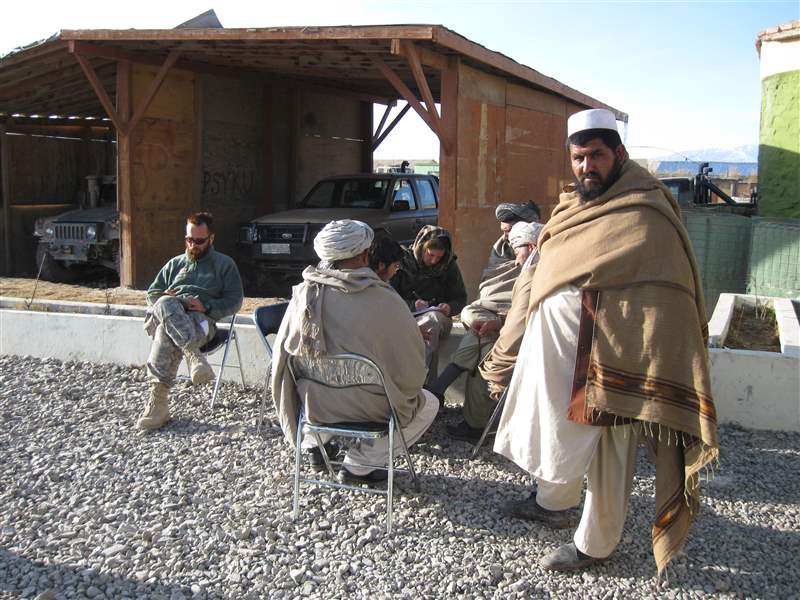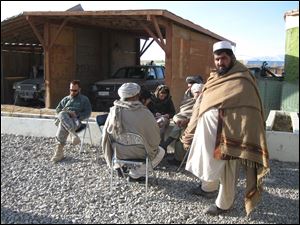
Good intentions lost in translation, complexities of war in Afghanistan
8/31/2013
Author Vanessa Gezari interviews elders in Zormat, Afghanistan.

Author Vanessa Gezari interviews elders in Zormat, Afghanistan.
Sometimes the canyon of differences between one culture and another can be illustrated with something as simple as the idea of a mailbox.
Deep into Vanessa Gezari’s engrossing and important The Tender Soldier: A True Story of War and Sacrifice is a telling anecdote that goes a long way toward describing how alien foreign countries can be to well-intentioned but ignorant Americans.
During a briefing about an area in Afghanistan where a group of U.S. social scientists were about to deploy to help soldiers better understand the local culture, an Army official described “night letters” to the group. The letters contained pro-NATO information (or propaganda, depending on your perspective) and they would be posted in a village for the locals to read.
Why, asked one of the new Human Terrain System social scientists, wouldn’t you just stick the letters in the Afghanis' mailboxes?
“[The team] had just arrived at the beginning of a long-awaited troop surge in one of the most important parts of the country for the U.S. military and they didn’t know that mailboxes were all but obsolete in Afghanistan,” writes Gezari, a former Blade reporter.
This ignorance is even more glaring when you consider that the social scientist had ostensibly been trained in the ancient country’s social mores and culture and should know better than to think you could just pop a letter in someone's mailbox.

Gezari’s book, released this month, tells the story of the Human Terrain effort, a government program that first deployed in Iraq in 2007. The idea behind the program is intriguing: Given the vast differences between western culture and those of countries such as Iraq and Afghanistan, what if trained anthropologists, political scientists, social scientists, academics, or psychologists were sent in to pair up with soldiers and try to better understand the civilian population?
In theory they would help smooth out conflicts between the military and the locals, creating a more humane war effort. A country like Afghanistan poses special challenges for the military because of tribal loyalties, geographic considerations, and religious nuances.
But almost instantly the program was mired in cognitive dissonance on a number of levels. Given that the Human Terrain effort grew out of counterinsurgency strategies, how much were the social scientists gathering intelligence to help American soldiers kill Taliban combatants and how much of their work was assisting the local tribes? Should anthropologists ethically use their training in a war effort? Given that the teams relied heavily on the U.S. soldiers for physical protection, how could they not be considered directly involved in the war against the Taliban?
As Gezari writes: “Success hinged on winning hearts and minds, but it also depended on good intelligence, for counterinsurgency was comprised of two distinct and seemingly contradictory kinds of activity. The first involved humanitarian aid and development, psychological operations, and political persuasion to soften local resistance, build relationships, and gather intelligence.
Gezari, a freelance journalist who spent years in Afghanistan, addresses these questions — there are no easy answers — by following a team led by Paula Loyd, the book’s tragic hero, who was based in Kandahar, a rugged, desolate, and violent region of the country. She was committed to the program and to helping the Afghan people and was respected by both the local tribes and the soldiers with whom she patrolled.
Educated at Wellesley College and pursing a master’s degree at Georgetown University, Loyd was a member of the Army Reserves on Sept. 11, 2001. Her unit was called up and her journey to the Human Terrain program was fast-tracked.
The Tender Soldier adeptly weaves the story of Loyd and some of her team members with the history of the program, the philosophy behind it, and the action on the ground. Gezari smartly starts the book with Loyd and the horrific incident that she and her team suffered in 2008, and then works back from there, filling in the details of the Human Terrain program with the back stories of some of the key players.
The result is a gripping tale that exposes the strange mix of idealism and political calculation that can drive U.S. policy in other countries. Gezari writes crisply and with a clear sense of purpose while maintaining a journalist’s objectivity about her subject. She reaches conclusions, but not before exploring all the angles and considering each important perspective.
Along with Sebastian Junger’s War and Jake Tapper’s The Outpost: An Untold Story of American Valor, her work is an important piece in the growing canon of historical works about the war in Afghanistan. It should be considered essential reading to anyone interested in understanding the war and its effect on the people who had to fight it.
Contact Rod Lockwood at: rlockwood@theblade.com or 419-724-6159.